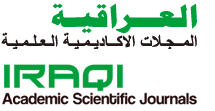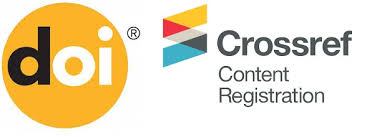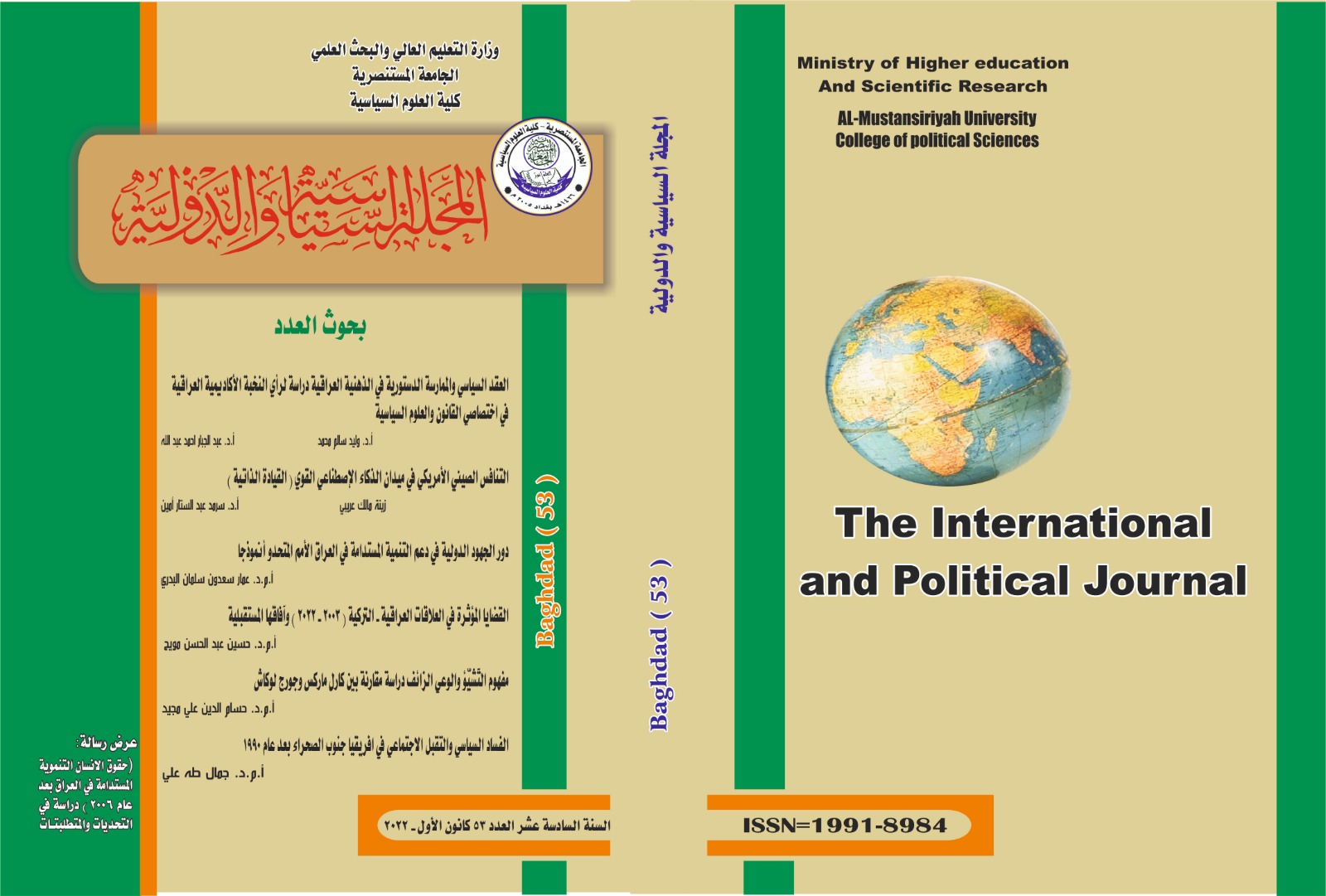Russian strategic directions in the Middle East goals- determinants- future dimension))
DOI:
https://doi.org/10.31272/ipj.i56.267Keywords:
Russian strategy, Middle East, Russian role, determinants, future visionAbstract
According to the contemporary Russian strategic approach, the Middle East region witnessed a gradual return to the influential role of this country, as Russia achieved great rapprochement with the region and was able to restore its relations with some of its countries. It also tended to play political and military roles in pivotal issues. This return was accompanied by an increasing desire to penetrate several regions’ countries. Such a penetration would help Russia in ensuring a better position in international interactions and open a new vital field to maximize its strategic interests.
References
المصادر باللغة العربية :
آنا بورشفسكايا. 2017 . "كيف هزَّم بوتين الولايات المتحدة في سوريا." معهد واشنطن للدراسات ، تحليل السياسات . http://www.washingtoninstitute.org/ar/policy-analysis/view/how-putin-checkmated-the-u.s.-in-syria.
السيد, عزت سعد. 2015. السياسة الروسية وأمن الشرق الأوسط.. بين الإرهاب وإيران، ، تحليلات - قضايا عالمية. 30 اغسطس. http://www.siyassa.org.eg/News/5466.aspx.
الشيخ, نورهان. 2014. "التحديات والقيود: حدود الدور الروسي في منطقة الشرق الأوسط." مركز حمورابي للبحوث والدراسات الاستراتيجية.
—. 2015. "السياسة الروسية تجاه الشرق الأوسط: هل تتجه روسيا إلي مزيد من الانخراط في أزمات المنطقة." مجلة السياسة الدولية. 13 12. http://www.siyassa.org.eg/News/7629.aspx.
العوضي, حسني عماد حسني. 2017. السياسة الخارجية الروسية زمن الرئيس فالديمير بوتين. برلين: المركز الديمقراطي العربي للدرسات االستراتيجية والسياسية االقتصادية.
القادر, نزار عبد. 2017. "الشراكة الروسية – الإيرانية في سوريا تأثيرها على الوضع الجيو-استراتيجي في الشرق الأوسط." مجلة الدفاع الوطني اللبناني 99.
النعمان, مصطفى أحمد. 2016. الصين تقرع أبواب الشرق الأوسط.. السياسة تواكب الاقتصاد. 26 1. http://www.siyassa.org.eg/News/8683.aspx.
آنا بورشفسكايا. 2017. " أهداف روسيا الاستراتيجية في الشرق الأوسط وشمال أفريقيا، معهد واشنطن للدراسات ، تحليل السياسات." 15 حزيران. http://www.washingtoninstitute.org/ar/policy-analysis/view/russias-strategic-objectives-in-the-middle-east-and-north-africa.
آنا بورشفسكايا و فيليب غوردون. 2016 . سياسة بوتين الشرق أوسطية: الأسباب والنتائج. 23 Mar. http://www.washingtoninstitute.org/ar/policy-analysis/view/putins-middle-east-policy-causes-and-consequences.
ايمان عنان. 2017. "ترامب ومستقبل النفوذ الروسي في الشرق الأوسط،." مركز البديل للتخطيط والدراسات الاستراتيجية. https://elbadil-pss.org/2017/02/26.
بولك, ويليام آر. 2013. فهم سوريا: من فترة ما قبل الحرب الأهلية إلى ما بعد الأسد. 10 ديسمبر. http://www.theatlantic.com/international/archive/2013/12/understanding-syria-from-pre-civil-war-to-post-assad/281989.
حاتم،, عماد الدين. 2004. المستقبل الجيوبوليتيكي لروسيا ، شؤون الأوسط،. المجلد العدد 113. بيروت: مركز الدراسات الإستراتيجية.
خانا, باراج. 2009. العالم الثاني:السلطة والسطوة في النظام العالمي الجديد،الدار العربية للعلوم ،ترجمة دار الترجمة. لبنان: باراج خانا.
زيدان, ناصر. 2013. دور روسيا في الشرق الأوسط وشمال أفريقيا من بطرس الأكبر حتى فلاديمير بوتين، ط1. بيروت: الدار العربية للعلوم.
سعدالدين, نادية. 2016. الارتباك الاستراتيجي: اقترابات القوى الكبرى في منطقة الشرق الأوسط. http://www.siyassa.org.eg/News/7629.asp.
سلامة, عبد الغني. 2012. "السياسة الروسية في الشرق الأوسط"، شئون عربية. المجلد العدد 151. القاهرة: الأمانة العامة لجامعة الدول العربية.
طاهر, احمد. 2017. دوافع الوجود الروسي ومحدداته السياسية الدولية في مياه المتوسط،. الإصدار العدد 107. ابريل. http://www.siyassa.org.eg/News/11989.aspx.
علام, مصطفى شفيق. 2017. "سيناريوهات محتملة: حدود التمدد الروسي في الشرق الأوسط في عهد ترامب." مركز المستقبل للأبحاث والدراسات المتقدمة. https://futureuae.com/ar/Mainpage/Item/2419.
علوي, مصطفى. 2016. روسيا وأمريكا في سوريا والعراق .. صفقة غير معلنة. 31 1. http://www.siyassa.org.eg/News/7631.aspx.
علي, عبدالصادق. ٢٠١٠ . روسيا والبحث عن دور جديد: العرب في السياسة الخارجية الروسية . أبو ظبي: دارالفكر.
غيث, مي. 2015. التدخل الروسي في سوريا: الأبعاد والسيناريوهات. 25 نوفمبر. http://eipss-eg.org/.
لعروسي, محمد عصام. 2017 . "الاستراتيجية العسكرية الروسية إزاء الشرق الأوسط في ظل الأزمة السورية." مجلة العلوم السياسية والقانون (المركز الديمقراطي العربي) (العدد الثاني).
—. 2016. انتخاب ترامب ورهانات السياسة الخارجية الأمريكية، على الرابط. نونبر. https://www.hespress.com/writers/328371.html.
محمود الريماوي. 2015. “ماذا سيضيف تعاظم الوجود الروسي في سوريا. 22 ايلول. http://www.siyassa.org.eg/News/5483.aspx.
مركز الزيتونة للدراسات. 2016. افاق الدور الروسي في الشرق الاوسط، تقدير استراتيجي (94). 1 12. https://www.alzaytouna.net/2016/12/01.
موسى, راندا. 2013. "بين التوتر والتوازن: حسابات وقضايا العلاقات الروسية- الأمريكية." السياسة الدولية المجلد 48 ( العدد 194): ص 115.
يفجيني بـريـمـاكـوف. ٢٠١٠. العالم بـدون روسـيـا: قصر النظر وعواقبه، ترجمة عبد الله حسن. دمـشـق: دارالفكر.
المصادر باللغة الانكليزية :
Anna Borshchevskaya. 2017. How Putin Defeated the United States in Syria. The Washington Institute for Policy Analysis. http://www.washingtoninstitute.org/ar/policy-analysis/view/how-putin-checkmated-the-u.s.-in-syria.
Sayed, Ezzat Saad. 2015. Russian Policy and Security in the Middle East. Between Terrorism and Iran, Analysis - Global Issues. 30 Aug. http://www.siyassa.org.eg/News/5466.aspx.
Sheikh, Nourhan. 2014. “Challenges and Constraints: The Limits of Russia’s Role in the Middle East.” Hammurabi Center for Research and Strategic Studies.
. — 2015. Russian Policy Towards the Middle East: Is Russia Going to Get More Involved in the Region’s Crises?” Journal of International Politics. 13 12. http://www.siyassa.org.eg/News/7629.aspx .
Al-Awadi, Hosni Emad Hosni. 2017. Russian Foreign Policy under President Vladimir Putin. Berlin: The Arab Democratic Center for Economic, Strategic and Political Studies.
Al-Qader, Nizar Abd. 2017. “The Russian-Iranian partnership in Syria and its impact on the geo-strategic situation in the Middle East.” Lebanese National Defense Journal (99).
Al-Numan, Mustafa Ahmed. 2016. China is knocking on the doors of the Middle East. Politics keeps pace with the economy. 26 1. http://www.siyassa.org.eg/News/8683.aspx.
Anna Borshchevskaya. 2017. “Russia’s Strategic Objectives in the Middle East and North Africa.” The Washington Institute for Policy Analysis. June 15th. http://www.washingtoninstitute.org/ar/policy-analysis/view/russias-strategic-objectives-in-the-middle-east-and-north-africa.
Anna Borshchevskaya and Philip Gordon. 2016. Putin's Middle Eastern Policy: Causes and Consequences. Mar 23 http://www.washingtoninstitute.org/ar/policy-analysis/view/putins-middle-east-policy-causes-and-consequences.
Iman Annan. 2017. “Trump and the Future of Russian Influence in the Middle East.” Alternative Center for Planning and Strategic Studies. https://elbadil-pss.org/2017/02/26 .
Polk, William R. 2013. Understanding Syria: From Pre-Civil War to Post-Assad. December 10th. http://www.theatlantic.com/international/archive/2013/12/understanding-syria-from-pre-civil-war-to-post-assad/281989 .
Hatem, Emad El-Din. 2004. The Geopolitical Future of Russia, Middle Affairs. Volume No. 113. Beirut: Center for Strategic Studies.
Khanna, Parag. 2009. The Second World: Power and Power in the New World Order, Arab House for Science, translated by Dar Al Tarjama. Lebanon: Parag Khanna.
Zidan, Nasser. 2013. Russia's Role in the Middle East and North Africa from Peter the Great to Vladimir Putin, 1st edition. Beirut: Arab House for Science.
Saadeddin, Nadia. 2016. Strategic Confusion: Approaches of Major Powers in the Middle East. http://www.siyassa.org.eg/News/7629.asp.
Salama, Abdul Ghani. 2012. “Russian Policy in the Middle East,” Arab Affairs. Volume No. 151. Cairo: General Secretariat of the League of Arab States.
Taher, Ahmed. 2017. The motives of the Russian presence and its international political determinants in the Mediterranean waters. Issue No. 107. April. http://www.siyassa.org.eg/News/11989.aspx .
Allam, Mustafa Shafiq. 2017. “Possible Scenarios: The Limits of Russian Expansion in the Middle East under Trump.” Future Center for Research and Advanced Studies. https://futureuae.com/ar/Mainpage/Item/2419.
Alawi, Mustafa. 2016. Russia and America in Syria and Iraq...an undeclared deal. 31 1. http://www.siyassa.org.eg/News/7631.aspx.
Ali, Abdul Sadiq. 2010. Russia and the Search for a New Role: Arabs in Russian Foreign Policy. Abu Dhabi: Dar Al-Fikr.
Ghaith, May. 2015. Russian Intervention in Syria: Dimensions and Scenarios. November 25th. http://eipss-eg.org/.
Laroussi, Mohamed Essam. 2017. "The Russian military strategy towards the Middle East in light of the Syrian crisis". Journal of Political Science and Law (Arab Democratic Center) (second issue).
—.2016". Trump's election and the stakes of American foreign policy". https://www.hespress.com/writers/328371.html.
Mahmoud Al-Rimawi. 2015. “What Will the Growing Russian Presence in Syria Add? September 22". http://www.siyassa.org.eg/News/5483.aspx.
Al-Zaytouna Center for Studies. 2016. The prospects for the Russian role in the Middle East, a strategic assessment (94). 1 12. https://www.alzaytouna.net/2016/12/01.
Moses, Randa. 2013. “Between Tension and Balance: Calculations and Issues in Russian-American Relations.” International Politics Volume 48 (No. 194): p. 115.
Evgeny Primakov. 2010. The World Without Russia: Myopia and Its Consequences, translated by Abdullah Hassan. Damascus: Dar Al-Fikr.
Additional Files
Published
How to Cite
Issue
Section
License

This work is licensed under a Creative Commons Attribution 4.0 International License.
Journal Policies
All articles published in the International and Political Journal are licensed under a Creative Commons Attribution 4.0 International License. This means that the Authors can:
The journal allows reuse and remixing of content in accordance with a Creative Commons license.
Copy and redistribute the material in any medium or format.
Policy of publishing in The International and Political Journal
The journal is committed to the ethics of scientific publishing, and according to the publication ethics report of the journal.
The decision to publish is based on the value of the scientific research, to what extent it meets the conditions of publication approved, the declared policy of the journal, and its specialty.
It is based on the principles of the scientific honesty, and originality of research submitted for publication. It deals with the names of reviewers and their reports with great confidentiality.
The opinions published in the journal reflect the views of the authors, and not necessarily reflect the opinion of the editorial board.
The journal does not adhere to the publication of whatever comes to it. The time and place of publication are subject to technical considerations adopted in the editorial plan of the journal.
The journal does not abide to return the research papers to their owners whether accepted for publication or not.
The researcher is to be provided with the acceptance of publication within about 24 WEEKS. As for publication, the editorial board reserves its right in priority of publishing. The arrangement of the research papers in the same issue is subject to technical standards.
Diversify of publishing papers from solid universities and scientific centers from inside and outside Iraq is preferable.
The journal maintains hard copies and electronic archive of the published issues in addition to the publication of the research papers.
The journal also publishes the issues electronically through the website of the journal, and the official website of the Iraqi academic journals, and makes it possible to download. Thus, documenting the intellectual property of the research papers and publishing them internationally is achieved.
Terms of publication may be modified when necessary with no previous notice.
The researcher obtains a copy of his research paper. If he wishes to buy acopy of the journal, the volume costs ID 10000 from inside Iraq and $8from the outside.
The Editorial Board considers that the researcher who submits his research paper for publication in the journal has already read the terms and conditions of publication and agreed on them.
The journal publishes the research papers of the postgraduate students in special issues for this purpose.
Stages of editing and publishing:
The researcher undertakes that his research has never been published before, and has not been submitted for publication to other sides until the end of the evaluation procedures and the acceptance of publication in the journal.
The research papers submitted for publication are to subjected for preliminary examination by the editorial board to determine their suitability for the journal specialization, its policy and the safety of scientific research procedures, and then to indicate its eligibility for scientific evaluation. The editorial board may apologize for accepting the research all together or require the researcher to amend it in accordance with the journal policy before sending it to editors.
After conducting the scientific evaluation, the research paper returns back to the researcher to make the required amendments within a maximum of two weeks.
A copy of the final research paper is to be submitted to the secretariat of the journal a hard copy and a soft copy on a CD, in both Word and PDF format. The researcher is fully responsible for the typing and linguistic mistakes after submitting the full research paper on a CD.
Plagiarism checker
All research papers are subjected to Turnitin program to uncover plagiarism before being sent to scientific evaluation. The researcher undertakes a written pledge to take the legal and moral responsibility, in the event of the emergence of plagiarism or taking from the efforts of other researchers, without a reference to them. The journal uses appropriate anti-plagiarism software, such as Turnitin to check for plagiarism.
Dealing with Allegations of Research Misconduct
The Journal shall take reasonable and serious steps to identify and prevent the publication of papers where research misconduct has occurred, including plagiarism, citation manipulation, and data falsification/fabrication.
Scientific Evaluation:
Scientific evaluation strengthens the research paper submitted to the journal and helps to take the appropriate decision by the editorial board to publish it. It also benefits the researchers to improve and correct their research papers.
The research paper is sent to three evaluators in the same specialty to evaluate












